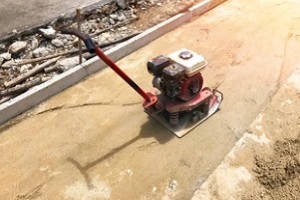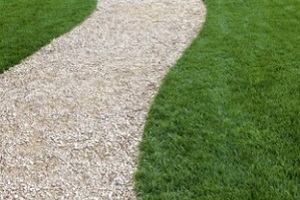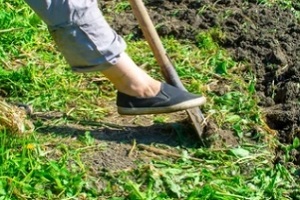 Soil compaction can be a major problem in a garden, and it is something that you may not even realize is occurring. Consider what happens when you pour water on a solid surface such as a stone countertop versus what occurs when you pour water on top of a sponge. These two situations are a good way to envision the difference between compacted soil and soil that is in the right condition to help your garden thrive.
Soil compaction can be a major problem in a garden, and it is something that you may not even realize is occurring. Consider what happens when you pour water on a solid surface such as a stone countertop versus what occurs when you pour water on top of a sponge. These two situations are a good way to envision the difference between compacted soil and soil that is in the right condition to help your garden thrive.
What Is Soil Compaction?
Put simply, soil compaction refers to the reduction of pore space in your soil. It occurs when the voids that are normally found between the particles of soil have been removed. This typically happens when something collapses the air pockets that exist between the components of the soil, usually in the form of pressure combined with weight.
This may be done intentionally with mechanical means to compact soil to provide a firm base for construction projects such as highways and pavements. However, in garden beds, soil that is too compacted is undesirable for several reasons.
Why Soil Compaction Should Be Avoided In Gardens
When soil is too compacted in a garden bed, plants will be unable to access the oxygen, nutrients and water they need to take in from the soil up through their roots because the particles of soil are pressed together too tightly, eliminating the small pockets of air they need to thrive. Much like the stone countertop we mentioned earlier, compacted soil has lower water retention capabilities.
When roots cannot move through soil vertically because it is too compacted, they will seek a horizontal path. They may form a more shallow root system and impact the plants surrounding them. If seedlings are planted in compacted soil, they will struggle to make their way up through the soil to get the sunlight needed for growth. In addition, compaction can destroy the beneficial fungi plants need to thrive.
Ways Of Preventing Soil Compaction
Here is a look at some of the best ways you can prevent soil compaction from occurring in your garden.
Don’t Work Soil That Is Too Wet or Dry
If you work the ground in conditions that are not ideal, soil compaction may occur. For example, if soil is too wet when you till it, the structure of the soil may collapse. However, working soil when it is too dry may disrupt its natural structure and cause it to collapse. If your soil lacks sufficient organic material to fluff it up, some parts of the soil may settle together when you work it. Working soil too often can also lead to compaction.
Do Not Walk Or Stand On Your Garden Beds
It is essential to avoid walking across your garden beds or standing in them in places where you intend to grow plants, as repeatedly placing your weight over the soil will cause it to compact.
Use Garden Paths
 Walking across your garden is difficult to avoid entirely as you need to stay in certain spots of the garden in order to tend to your plants or harvest. The best solution to this issue is installing walking paths or stepping stones.
Walking across your garden is difficult to avoid entirely as you need to stay in certain spots of the garden in order to tend to your plants or harvest. The best solution to this issue is installing walking paths or stepping stones.
A walking path where you do not intend to plant anything provides you with a visual point of reference for a safe place to stand to avoid disrupting the soil and compacting it.
Stepping stones do compact soil slightly, but they distribute your weight across a broader surface area. They also serve an additional benefit; as anyone who has ever turned over a large stone in a garden can attest, they serve as a great habitat for worms and other critters that can aerate the soil.
Consider Raised Beds Or Fencing
If you have large pets or children who are prone to wandering through the yard or garden, raised beds and/or fencing can be used to keep their weight off the areas where you plan to plant.
Plan The Width Of Your Garden Beds Carefully
Avoid making your garden beds wider than four feet if you are placing a walking path on either side of the bed. This is the right size to allow you to easily reach the middle of the bed when you are standing on either side of it without having to actually step into the bed itself. If there is a walking path on just one side of your garden bed, keep the bed’s size to roughly the width of your arm.
What Can You Do For Soil That Is Already Compacted?
If the soil in your garden is already heavily compacted, don’t worry. It is possible to regenerate healthy soil.
If you want to fix compacted garden soil quickly so that you can put in seedlings or sow seeds right away, then till or break up the top of the compacted soil and add some worm castings or compost around six inches thick or more. Then, put in the seeds or seedlings and apply a layer of mulch about an inch or two thick. Pine straw is a good choice because it won’t block germinating seeds.
 However, if you have more time, you can regenerate the health of compacted soil using a slightly different approach that is more effective in the long run. Till the surface or break it up using a shovel and spread two to six inches of high-quality worm castings or compost across its surface. Cover this layer with three to six inches of mulch and ensure the area gets an inch or more of water each week. Within a month, the beds should be ready for planting.
However, if you have more time, you can regenerate the health of compacted soil using a slightly different approach that is more effective in the long run. Till the surface or break it up using a shovel and spread two to six inches of high-quality worm castings or compost across its surface. Cover this layer with three to six inches of mulch and ensure the area gets an inch or more of water each week. Within a month, the beds should be ready for planting.
Reach Out To The Northern Virginia Soil Experts
If you are carrying out any type of gardening or home project involving soil, reach out to the Northern Virginia soil experts at Dirt Connections. We are experienced in supplying residential and commercial projects of all sizes with a range of soil types and can offer advice on the best materials for your project. We can deliver bio mix soil, organic topsoil and fill dirt to your site for a reasonable price, so get in touch today online or over the phone at 703-828-0866 to learn more about our offerings.
Summary

Dirt Connections was started with one goal in mind: providing quality residential and commercial construction services to clients on time and on budget. Reach out for more information on how we can support your next project.
For your convenience our estimates are free and by appointment. Call 703-940-9949 for a free estimate today!









































